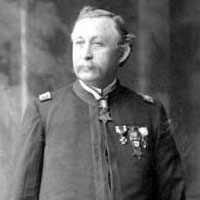

In September 1897, Horatio Collins King was rewarded with the highest recognition of his services in the Civil War, the Congressional Medal of Honor.62 Over three decades after the war had ended, this honor meant a great deal to King, and in some respects it was an affirmation of the progressive work he had done for veterans since the end of the war. The medal was awarded for his courage in the Battle of Five Forks near the Dinwiddie Courthouse in Virginia, which occurred on April 1, 1865 in the last days of the war.63 The citation on the award reads as follows:
While serving as a volunteer aide, carried orders to the reserve brigade and participated with it in the charge which repulsed the enemy.64 Not expecting such an award, King was surprised and proud. In a letter ot R. A. Alger on September 21, 1897, King wrote:
...this exalted recognition of a service for which, at the time, I felt amply rewarded by the approval of my associates and the brevet of colonel, touches me deeply, and it will be a satisfaction and pride to my children.65 When King received the Medal of Honor, attention was once again bestowed on him as reporters flocked to interview him about the Medal and the events that led to his receiving it. However, King saw this opportunity not as a chance to discuss himself and his own accomplishments, but rather one where he could draw renewed attention to the Civil War and the men who had fought there. King nearly always refused to discuss the Medal of Honor, and never mentioned it within an interview himself. When asked to describe the events at the Battle of Five Forks, for which he won the distinguished honor, King described them in general terms that applied to the activities of the entire Union Army on that day, and did not discuss his own personal tasks during that battle. He used the occasion therefore to draw attention back to his comrades and to the bravery they had all displayed during those last days of battling the Confederate Army.
King used the last few decades in his life in just this way, trying to renew attention and interest in Civil War veterans in a nation that was moving on into the next century, leaving the war years behind. Although still powerful, even the Grand Army of the Republic lost some of its clout as the nineteenth century closed, in some ways closing a chapter to its history that King had been such an amazing part of. However, not content to see his work go to waste, he did not give up. As was seen, he continued to raise attention about the plight of veterans through his writing, speeches, and political choices - supporting Theodore Roosevelt all the way to the White House, where he passed special legislation concerning veterans.Although he was mostly confined to his bed following a paralyzing stroke in 1914, King continued to do what he could to complete the agenda that he had set for himself, much to the concern of his wife, who constantly worried about his health and tried to limit the amount of interviews that he did from his bedroom in their Brooklyn home. A deeply religious man, King commented in 1916 in the Brooklyn Daily Eagle on how his friendship with Henry Ward Beecher and his membership in the Plymouth Church aided in his recovery from the horrors of war that he had witnessed.
Horatio Collins King died on November 15, 191867, having lived to see his nation four days before come out of a second "great war" victorious. He was mourned throughout the United States as a soldier, activist, politician, and writer. At his funeral, held at Plymouth Church, the eulogy was given by Beecher's successor, Dr. Newell Hillis, who stated,
This [his relationship with Beecher and the church] may have been very fortunate for me, for my piety may have been more or less weakened by the looseness and to some extent irresponsibility of a great war.66
With that superb enthusiasm for the Republic General King lived and here in this old church, in the faith of God, General King died. In the spirit of sorrow we recall him but in reality we are not sad. We are here to celebrate him. We celebrate the quality of his manhood produced in this old church. We are here to celebrate his capacity for friendship and his genius for service. For him and for us there is no death.68 In many ways, for many years, Horatio Collins King had done his best to see that for even his fallen comrades, as well as for himself and those who survived with him, that there "was no death" for them and their sacrifices in the great American Civil War.
|
|
|
|